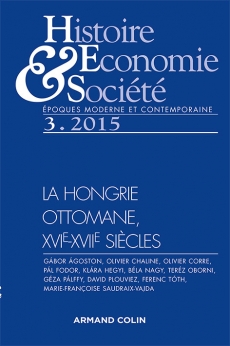
Histoire, économie et société (3/2015)
Pour acheter ce numéro, contactez-nous
Recevez les numéros de l'année en cours et accédez à l'intégralité des articles en ligne.
Même si les Hongrois installés dans le Bassin des Carpates ont occupé le milieu géographique de l’Europe et se sont ralliés successivement à la civilisation occidentale (latine), leur pays est resté une zone de frontière des civilisations durant les mille ans écoulés depuis leur arrivée. Cette situation frontalière détermina solidement l’histoire et la pensée des Hongrois ce qui se traduit surtout dans le sentiment d’« être seul au monde ». Sans oublier les éléments orientaux de leur identité, ils choisirent toujours l’Occident dans les grandes crises de leur histoire (invasion desMongols, conquête ottomane). Néanmoins, cet « orientalisme », qu’on peut décrire par le terme symbolique d’« héritage turc » en faisant allusion à leurs relations turques intenses, avait un rôle de plus en plus grandissant dans la pensée des Hongrois. Il en résulta beaucoup d’ambiguïtés, de troubles identitaires et de programmes politiques contradictoires. Tandis que le souvenir de la lutte contre les Turcs ottomans devint une des pierres angulaires de la conscience nationale émergente, les patriotes hongrois se tournèrent avec beaucoup d’enthousiasme vers le monde turc où ils croyaient découvrir les origines et les formes anciennes du caractère et de l’âme de leur nation. Le phénomène de l’« ouverture vers l’est » dans la politique extérieure hongroise ne peut surprendre que ceux qui ignorent le rôle équivoque que l’ « héritage turc » jouait dans l’histoire millénaire des Hongrois.
Although the Hungarians, who invaded and then settled the arpathian Basin, occupied the geographical middle of Europe and have since been part of Western or European civilisation, over the course of the last millennium they have mostly been relegated to the margins of that civilisation. This frontier situation and experience profoundly influenced both the history of Hungary and the mentality of its inhabitants and manifested itself in a sense of “aloneness”. But while the Hungarians have never forgotten the oriental components of their identity, in all decisive situations and at all major turning points, they opted for the West, whatever the costs (this is what happened at the time of the Mongol and Ottoman invasions). Yet, from the period of the Ottoman domination of the country onward, the “orientalness” – which can best be described with the notion of “Turkish legacy” based on the intense Turkish contacts of the Hungarians – gradually gained ground in the Hungarian mind. This resulted in considerable ambiguity, identity troubles and rival political programmes during the nineteenth century. While the memory of the century-long fight against the Ottomans became a cornerstone of Hungarian national consciousness, the Hungarian patriots turned with great enthusiasm toward the contemporary Turkish world where they were intent on finding their origins, the ancient forms of the Hungarian character and soul. The present Hungarian government’s policy of “opening for the East” can only be a surprise for those who do not consider the role of the ambiguous “Turkish legacy” in the last millennial history of the Hungarians.

